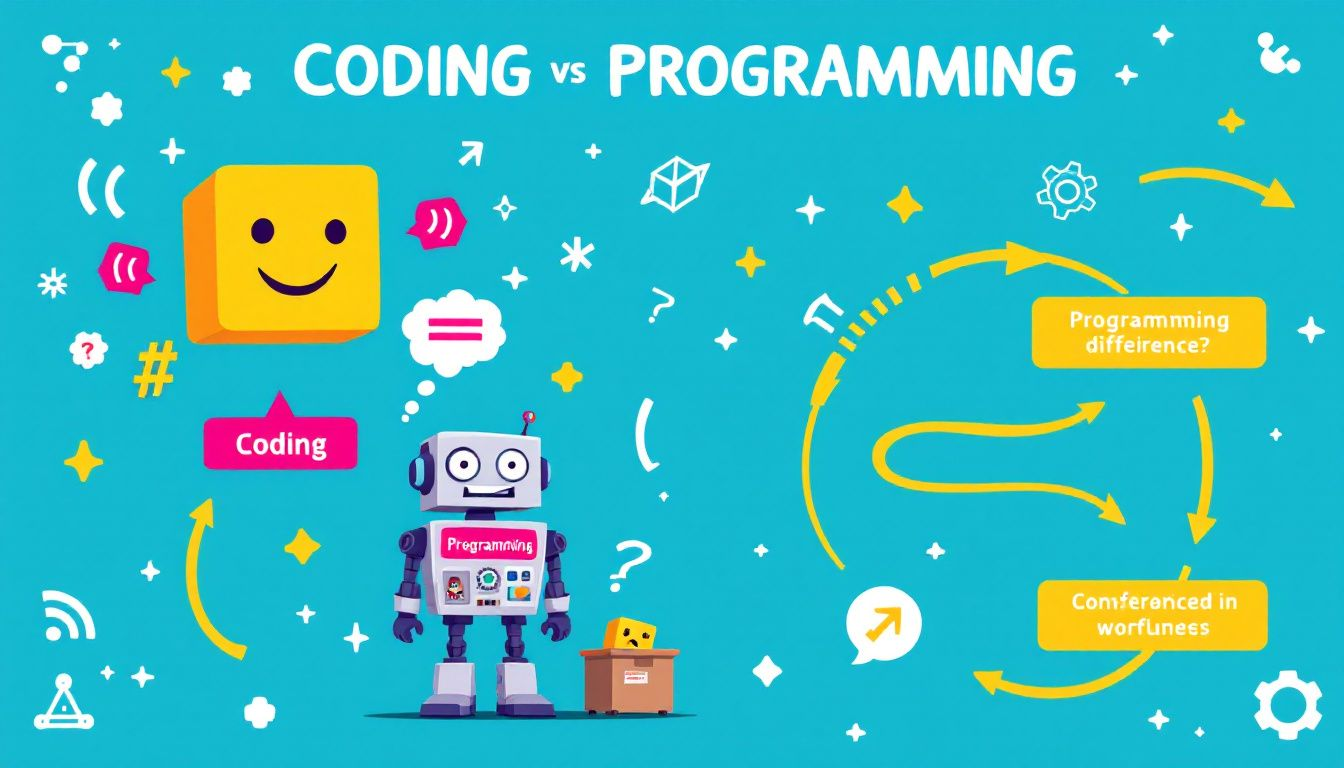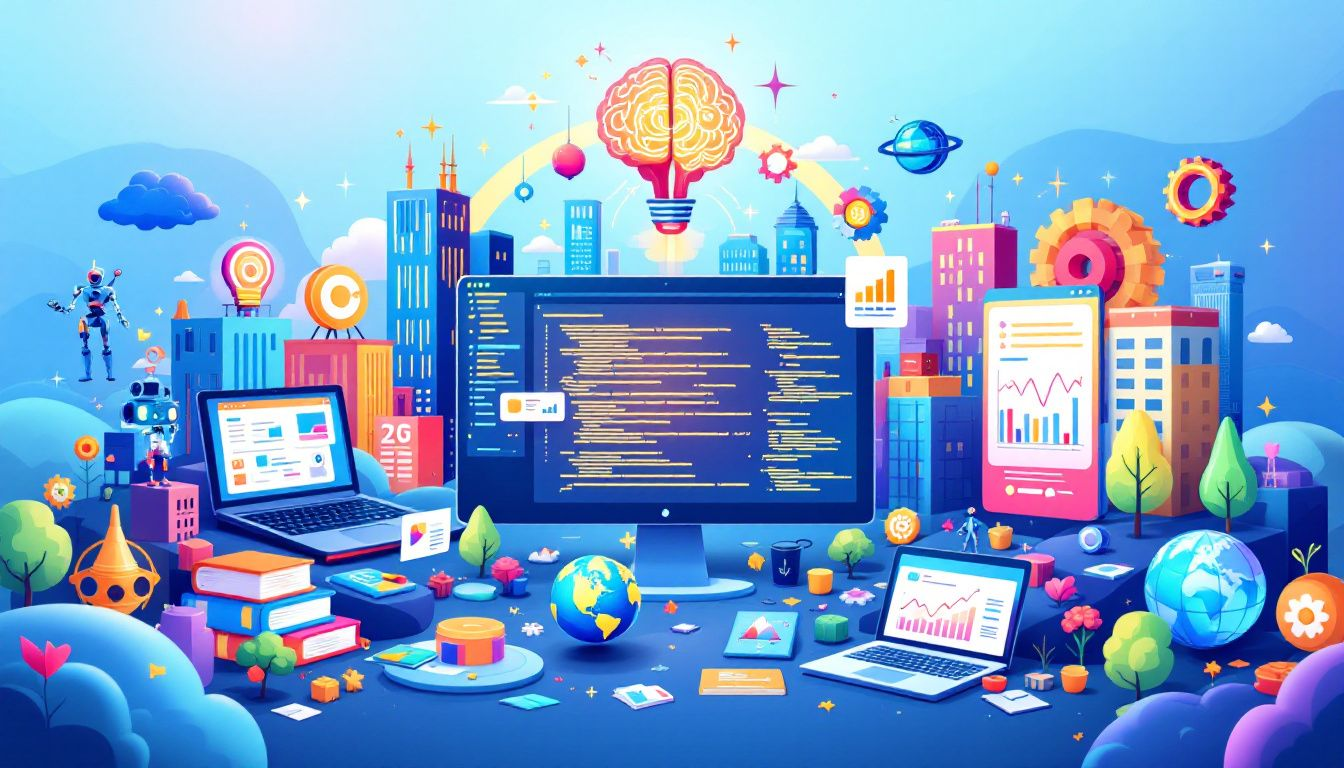November 27, 2024
Coding vs Programming: What's The Difference?
Coding vs programming: what’s the difference? Coding involves writing instructions for computers. Programming includes planning, designing, and maintaining software. This article will explore their roles, differences, and benefits.
Key Takeaways
-
Coding translates human instructions into a machine-readable format, serving as the foundation of software development.
-
Programming encompasses a broader scope, including planning, designing, and maintaining software to develop complex solutions.
-
Both roles are interdependent; coders write the code while programmers manage the overall architecture and design, highlighting the importance of collaboration in software development.
Defining Coding
Coding is the art of translating instructions into a machine-readable format. This process allows humans to communicate with computers, instructing them to perform various tasks. Coding involves using coding languages like JavaScript and Python to develop applications, websites, and more, including those that utilize machine learning.
Coding translates human instructions into a form that computer systems understand, using languages that computer hardware can interpret and execute, including machine code. Binary coded signals, consisting of 0s and 1s, are fundamental to how computers process information. Coders need a basic understanding of most programming languages to write effective code.
Coding is the foundation of software development and technology interaction, bridging human instructions and machine execution. Without coding, the sophisticated software and applications we use daily wouldn’t exist. Coders lay the groundwork for more complex programming tasks in the initial stages of software development.
Defining Programming
Programming, on the other hand, encompasses a broader range of activities beyond just writing code in a programming language. It involves planning, designing, testing, and maintaining software to meet specific requirements. Coding translates instructions, while programming involves understanding the problem and devising a logical solution.
Programming takes a systematic approach, from initial design to final implementation and maintenance. This stage-by-stage process ensures that the software developed is robust, efficient, and meets user needs. Programmers use advanced tools like code analysis tools, testing frameworks, and compilers to aid development.
Programming demands higher-level thinking and problem-solving abilities compared to coding. It involves writing code, designing software architectures, debugging, and optimizing code for performance. Programmers need to be adept at analytical decision-making and possess a deep understanding of computer science principles and programming languages.
Key Differences Between Coding and Programming

Coding and programming are closely related fields. However, they have different purposes in software development. Coding is the act of translating instructions into a machine-readable format, whereas programming involves planning, designing, and maintaining software to solve complex problems.
Recognizing these differences clarifies the unique roles coders and programmers play in creating software applications.
Scope and Complexity
The scope and complexity of coding and programming differ significantly. Coding centers on writing code for a specific task, often using trial-and-error methods. For instance, a coder might write a simple script to automate a repetitive task, relying on basic knowledge of a coding language and simple syntax.
In contrast, programming involves a more systematic approach, encompassing the entire software development lifecycle, from analysis and planning to implementation and maintenance. Programmers manage complex projects, requiring a deep understanding of software architecture, project management, and the ability to design comprehensive solutions for intricate problems.
Tools and Environments
Coders usually use simpler tools and environments, like text editors such as Sublime Text and Atom, to write and edit code. These advanced code editors facilitate writing code, allowing coders to focus on translating instructions into a machine-readable format.
Programmers use advanced tools such as code analysis tools, testing frameworks, and integrated development environments (IDEs) like Visual Studio Code and Eclipse. These tools support the comprehensive development of software applications, aiding in tasks like debugging, code optimization, and project management.
Skills and Expertise
The skills and expertise required for coding and programming also vary. Coders need a fundamental understanding of programming languages and effective code writing skills. They focus on memorizing syntax and understanding the practical applications of their code.
Programmers require higher-level thinking and a broader range of skills, including problem-solving, logical thinking, software architecture, and data structures. They must be proficient in algorithms, project management, and debugging, with a deep understanding of how to design and implement complex software solutions.
The Role of Coders

Coders play a crucial role in the initial stages of software development. Their primary responsibilities include writing code, testing, and debugging. Coders translate human instructions into machine language, ensuring that the software can perform the desired tasks.
Depending on their job title, coders might write code, simple scripts or test and debug complex code. They often start their careers in software development, laying the groundwork for advanced programming tasks.
The Role of Programmers

Programmers take on a broader range of responsibilities in software development. They design, build, test, and maintain software solutions based on user specifications. This involves collaborating with clients to identify needs and tailor software functionalities accordingly.
Programmers often work in teams, managing complex software projects that require extensive training and experience. They oversee the entire software development lifecycle, ensuring the final product is robust, efficient, and meets user expectations.
How Coding and Programming Work Together

Coding and programming are interdependent processes that work together to create functional software. While coders focus on writing the actual code, programmers handle the overall architecture and design of the software project. Collaboration between coders and programmers is crucial for developing high-quality software applications.
Communication skills are key for ensuring that coders and programmers can work effectively together. Coders translate designs into functional software, bringing programmers’ vision to life, while programmers guide the project from conception to completion.
Real-World Applications of Coding and Programming
Coding and programming have numerous real-world applications across various industries, showcasing their versatility and importance. Here are a few examples:
-
Web Development: Coding and programming are fundamental in creating websites, web applications, and mobile applications. Web developers use programming languages like HTML, CSS, and JavaScript to design and develop user-friendly and interactive websites. These languages enable developers to build responsive layouts, dynamic content, and seamless user experiences.
-
Artificial Intelligence and Machine Learning: Programming languages like Python, R, and Julia are essential for developing AI and ML models. These models can analyze vast amounts of data, make predictions, and automate tasks, driving innovation in fields such as natural language processing, image recognition, and autonomous systems.
-
Data Science: Coding and programming are crucial for collecting, analyzing, and visualizing data. Data scientists use programming languages like Python, R, and SQL to extract insights from data, enabling organizations to make informed decisions. These skills are vital for tasks such as data cleaning, statistical analysis, and creating data visualizations.
-
Gaming: The gaming industry relies heavily on programming languages like C++, Java, and Python to develop games for PCs, consoles, and mobile devices. These languages provide the performance and flexibility needed to create complex game mechanics, realistic graphics, and immersive experiences.
-
Healthcare: Coding and programming are used to develop medical software, analyze medical data, and create personalized treatment plans. For example, electronic health record (EHR) systems, medical imaging software, and telemedicine platforms all rely on robust programming to function effectively.
-
Finance: In the finance industry, programming languages like Java, Python, and R are used to develop trading platforms, analyze financial data, and create predictive models. These applications help financial institutions manage risk, optimize trading strategies, and provide better services to clients.
By understanding these real-world applications, it’s clear that coding and programming are integral to driving innovation and efficiency across various sectors.
Career Paths in Coding and Programming

The demand for software developers and programmers is expected to grow significantly due to the increasing reliance on software across various industries. Coders typically work in virtually every industry requiring technology, from finance to healthcare. The average annual wage for a computer programmer is $102,790, while software developers earn an average of $132,930.
Web developers, who often start their careers as coders, have an average salary of $87,580. The high demand for coding and programming skills translates into excellent job opportunities and earning potential for those with the right expertise.
Career paths in coding and programming are diverse, ranging from entry-level coding positions to advanced roles in software development and project management. With the right skills and experience, professionals in this field can enjoy lucrative and fulfilling careers.
Learning Paths for Coding and Programming
There are multiple ways to learn coding and programming, including college degrees, online courses, and coding bootcamps. Many successful programmers are self-taught, using resources like Codecademy and FreeCodeCamp to hone their skills.
Coding bootcamps are popular for offering intensive, hands-on training in a short period. These bootcamps focus on real-world applications and provide job placement support, helping graduates transition into tech careers. Some bootcamps emphasize communication skills, crucial for teamwork and client interaction.
Online platforms and coding bootcamps vary in length and focus, catering to different learning preferences. Whether you prefer hands-on learning or tutorial-based instruction, many options are available to help you develop your coding and programming skills.
Best Practices for Learning and Improvement
To become proficient in coding and programming, it’s essential to follow best practices for learning and improvement. Here are a few tips to help you on your journey:
-
Start with the Basics: Begin with a solid foundation in programming languages, data structures, and the software development lifecycle. Understanding these core concepts is crucial for tackling more advanced topics and projects.
-
Practice Regularly: Consistent practice is key to improving your coding skills and problem-solving abilities. Set aside time each day to write code, experiment with new techniques, and solve coding challenges.
-
Use Online Resources: Take advantage of online resources like coding tutorials, videos, and blogs to learn new programming languages and techniques. Platforms like Codecademy, FreeCodeCamp, and Coursera offer interactive lessons that cater to different learning styles.
-
Join Online Communities: Engage with online communities like GitHub, Stack Overflow, and Reddit to connect with other programmers, get feedback on your code, and learn from others’ experiences. These communities are valuable for networking and finding support.
-
Work on Projects: Apply your coding skills by working on real-world projects. Whether it’s a personal project, an open-source contribution, or a freelance gig, hands-on experience is invaluable for learning and growth.
-
Learn from Mistakes: Embrace mistakes as learning opportunities. Analyze what went wrong, understand why it happened, and use that knowledge to improve your coding skills. This iterative process is essential for becoming a better programmer.
-
Stay Updated: The tech industry is constantly evolving, so it’s important to stay updated with the latest trends and technologies. Follow industry news, attend webinars, and participate in workshops to keep your skills current and relevant.
By following these best practices, you can improve your coding and programming skills, stay motivated, and achieve your goals in the field of computer science. Embrace the journey of continuous learning, and you’ll find yourself well-equipped to tackle any challenge that comes your way.
Benefits of Coding and Programming Skills in Software Development
Coding and programming skills are foundational for creating technology and software applications that enhance human capabilities. These skills have contributed to the rapid growth of technology, driving advancements across various sectors, including finance, healthcare, and space exploration.
The high demand for coding and programming skills translates into good earning potential and opportunities for career growth. Mastering these skills opens numerous job opportunities and empowers individuals to contribute to technological innovation and solve complex problems.
Summary
In summary, coding and programming are distinct yet interdependent disciplines that play crucial roles in software development. Coding involves translating instructions into a machine-readable format, while programming encompasses the entire software development lifecycle, from planning and design to testing and maintenance. Understanding the differences and benefits of these skills can open up numerous career opportunities and empower you to contribute to technological advancements.
Whether you’re just starting your journey in tech or looking to deepen your expertise, mastering coding and programming skills is a valuable investment. Embrace the challenge, and you’ll find yourself at the forefront of innovation, creating solutions that shape the future.
Frequently Asked Questions
What is the main difference between coding and programming?
The main difference between coding and programming is that coding refers specifically to writing code in a machine-readable format, whereas programming includes the broader scope of the entire software development process, including planning, design, testing, and maintenance.
Do I need a college degree to become a programmer?
You do not need a college degree to become a programmer, as many successful individuals in the field are self-taught or have completed coding bootcamps. Practical experience and skills often outweigh formal education in the tech industry.
What tools and programming languages do coders and programmers use?
Coders often rely on text editors like Sublime Text and Atom, while programmers utilize more advanced tools such as code analysis tools and integrated development environments (IDEs) for greater efficiency. These tools are essential for enhancing productivity and ensuring code quality.
What are the career prospects for coders and programmers?
Career prospects for coders and programmers are strong, with high demand leading to excellent job opportunities and competitive salaries. On average, computer programmers earn around $102,790 annually, while software developers can make approximately $132,930.
How can I learn coding and programming skills?
To effectively learn coding and programming skills, consider enrolling in online courses from platforms like Codecademy or FreeCodeCamp, which provide interactive lessons and challenges. This approach allows you to build a strong foundation while learning at your own pace.